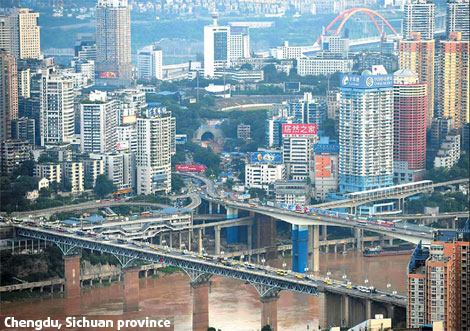


Jiaozi is recognized as the earliest paper currency in history after it was issued in 1023 in Chengdu, Sichuan province during the Northern Song Dynasty (960-1279), as part of the development of a thriving commodity economy.
More than 900 years later, Chengdu plans to build itself another financial center and regain its glory in financial history.
In December 2007 when Liu Qibao became the secretary of the Sichuan provincial Party committee, he advocated the development of a financial center in Chengdu as a way to raise Sichuan's clout as an economic power in southwest China.
On August 25, 2008 the Chengdu municipal government issued "Guidelines on Furthering Construction of a Financial Center in West China". The guidelines call for an organizational committee to lead the construction. Members of the committee include directors of municipal departments such as the Development and Reform Commission and Bureau of Finance. Chengdu Mayor Ge Honglin, has been appointed as the director of the committee and Sun Ping, deputy mayor and professor of Southwestern University of Finance and Economics, is the deputy director.
The committee is inviting banks, insurance and securities companies and supporting accounting and law firms to set up business. Online banking services, check processing and financial product development will be sectors for priority development.
By 2012 Chengdu hopes to attract 50 banks, 60 insurance companies and the same amount of securities firms employing 300,000 financial experts. At that time the city is predicting that the added value of its new financial industry will reach 35 billion yuan, and account for 12 percent of its service industry and 6 percent of Chengdu's GDP.
A Chengdu Investment Holding Group has also been founded with a registered capital of 3 billion yuan. The company will concentrate on investments in the insurance, trust and securities industries. Wu Zhongyun, director of Chengdu Financial Affairs Office, is the board chairman of the company.
"Financing channels should be widened to develop the economy of the western regions in China," Wu says.
Investors from home and abroad are welcome to take part in the new financial development of Chengdu. For example, energy and environmental protection projects are open to both Chinese and foreign insurance companies. Wu says he hopes that the Chengdu Investment Holding Group will be the channel through which international capital and domestic private funds can flow smoothly.
So far, 10 industrial investment funds that have raised 3 billion yuan have been approved by the central government. One of them is the tourism industry investment fund, which is developing smoothly following the May 12 earthquake.
Another important task for the Chengdu Investment Holding Group is to promote the development of financial institutions in rural areas, including investment in the reconstruction of Chengdu Rural Credit Union, establishment of the Chengdu Rural Commercial bank and an IPO for the Commercial Bank of Chengdu.
In the near future, rural banks and small loan companies are expected to also help solve financing difficulties in areas of Chengdu and the vast western regions of China.
Chengdu currently boasts branches or outlets of three policy banks, 16 joint-stock commercial banks and two regional banks. Seven foreign banks including Citibank, HSBC and Standard Chartered have opened branches in the city. The Bank of Tokyo-Mitsubishi UFJ, Ltd and BNP Paribas have opened representative offices and Nanyang Commercial Bank and JP Morgan Chase have applied to open branches in Chengdu.
By the end of 2007, banks in Chengdu attracted 640 billion yuan in deposits, a 21.5 percent increase compared with the previous year, while loans increased 22.3 percent, reaching 406 billion yuan.
The convenience brought about by the development of the banking industry is obvious. Clients are now able to pay water and electricity bills at the counters of bank branches or on the Internet. Through service hotlines, clients can also book plane tickets and hotels and even buy welfare lottery tickets.
The insurance industry is also developing rapidly. Currently there are 42 insurance firms in Chengdu,including eight branches and four representative offices of foreign insurers such as Allianz China Life Insurance and Groupama. By the end of November 2007 insurance premiums were up by 35.5 percent compared with 2006, reaching 12.2 billion yuan.
In addition, Chengdu has five securities companies and 83 securities sales offices. All the figures top other western regions of China.
However, competition to become a dominant financial center in western China is fierce. Chongqing, for example, is working to build itself a financial center in the upper Yangtze River area by 2015. In addition, Xi'an is now gaining power in providing outsourcing services for financial information technologies and business processing.
"Competition brings development. It is not bad for financial development in the western regions," Wu says.
But there are difficulties for the cities to overcome. When interviewed during the annual session of National People's Congress and Chinese People's Political Consultative Conference in March 2008, Huang Qifang, deputy mayor of Chongqing, noted "policy support from the central government and invitation of financial talents" were the two keys to develop the efinancial industry in western regions.
"Policy breakthroughs are always involved in reforms. I think the central government could create favorable tax policies to boost the financial industry," Huang said, and Wu has expressed similar ideas.
(China Daily 10/13/2008 page10)













